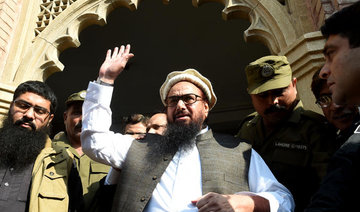LAHORE: Islamabad High Court (IHC) on Saturday conducted a hearing into a petition filed by Hafiz Muhammad Saeed, chief of Jamat-ud-Dawa, challenging the presidential ordinance promulgated last month which banned the JuD and Saeed’s charity organization Falah-e-Insaniat Foundation (FIF), for being on the UN’s watch list.
Saeed contended in his petition that he had cut off all ties with the banned Lashkar-e-Taiba (LeT) after he established the JuD in 2002 but India kept maligning his group for its past association with the LeT.
He said that he was put under house arrest twice, in 2009 and 2017, under international pressure and that the government of Pakistan placed the JuD on watch list after the UN Security Council passed a resolution against his organization.
Attorney General Ashtar Ausaf Ali told Arab News, that his office will defend the presidential ordinance under which JuD and FIF were banned.
“The ordinance is not only in line with our constitution but also in our supreme public interest,” said the attorney general. “My office will defend it in the court.”
Last month, President Mamnoon Hussain issued the Anti-terrorism (Amendment) Ordinance, 2018, to allow law enforcement agencies to firmly deal with groups proscribed by the UN and viewed unfavorably by the international community.
“We have challenged this ordinance in court since it is against the spirit of the constitution,” said Raja Rizwan Abbasi, Hafiz Saeed’s lawyer, while talking to Arab News.
“Pakistan has compromised its sovereignty by amending the law to please the United Nations Security Council. This amounts to giving authority to the UNSC to amend anti-terrorism laws of the country.”
Responding to the allegation, the attorney general said: “Pakistan is a responsible country that adheres to commitments made under various international conventions and treaties.
It is the obligation of our country to march with the changing times and enhance our capacity to combat terrorism in any form. The UN resolutions are binding on us, and our legislation ought to be in line with the findings and recommendations of the world body that is united in dealing with the menace of terrorism.”
According to the petition, “The promulgation of the ordinance and addition of Section 11-EE is not only prejudicial to the sovereignty [of the country] but also contradictory to the fundamental rights enshrined in the Constitution of Pakistan.”
The petition suggests that any legislation which is beyond the scope of Constitution, or Ultra Vires, can be struck down under Article 199 of the Constitution. It further requests the court that the said amendment in Section 11 B of the Anti Terrorism Act (ATA) and the addition of Section 11-EE may be declared illegal.
Justice Aamer Farooq of the IHC issued notices to the principal secretary to the president and the secretaries of law, Cabinet Division and Establishment Division after initial hearing. The court has been adjourned until third week of March.














